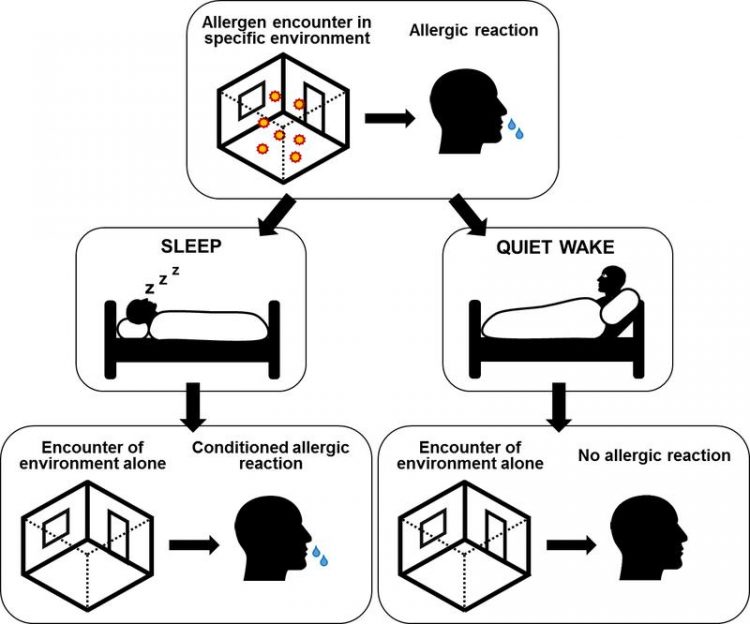Being in the wrong place can set off an allergic reaction

Sleep consolidates a learned association between allergens and a specific environment. Re-encountering the specific environment is afterwards sufficient to trigger a conditioned allergic reaction. Image courtesy of Luciana Besedovsky
Allergic reactions can occur without being triggered by an allergen such as grass or birch pollen – it is enough for the patient to be back in the same place in which he or she was previously exposed to the allergen, as researchers at the University of Tübingen have found.
However, this kind of conditioned reaction to an intrinsically neutral and harmless situation only happens after a sleep phase that follows the conditioning.
The new study on the influence of psychological factors on allergic reactions was led by Dr. Luciana Besedovsky and Professor Jan Born from the Institute of Medical Psychology and Behavioral Neurobiology.
The findings go some way towards explaining why allergic reactions are frequently observed as a form of placebo reaction when the original allergen is not even present. The study has been published in the latest Proceedings of the National Academy of Sciences.
The research team recruited volunteers with allergic rhinitis, who were then given a nasal spray containing their respective allergens (grass or birch pollen) in a neutral test room. The strength of the allergic reaction occurring in the test persons was measured by the amount of a specific enzyme in the nasal secretion.
Half of the test persons went to sleep for eight hours after this experiment, while the other half had to stay awake until the following evening. One week later, the experiment was repeated in the same test room. But this time no allergens were given. “The test persons reacted with allergic rhinitis already shortly after entering the room – but only those from the group that slept,” says Besedovsky.
Test persons who remained awake did not have an allergic reaction upon returning to the room in which the experiment was conducted, Besedovsky adds. Nor did members of the group who slept suffer a reaction in another place they were taken to in the second week.
The brain is a fast learner
“Just as in a conventional learning process, the sleep phase played a decisive role in our study. Only through sleep did the brain firmly connect a certain environment with an allergic reaction,” says Jan Born, adding that this is the first experimental proof that a specific location alone can trigger an allergic reaction.
The researchers believe that – as in many memory-building processes – the hippocampus plays a role in conditioning the organism to respond to its environment. And the hippocampus functions in a sleep-dependent manner.
“It is astonishing how quickly the immune system learns the mismatched reaction. In the experiment, a single allergen dose was sufficient to link the allergic reaction with the environment,” Besedovsky says. Deciphering this learning mechanism is a boost to research into both allergies and sleep.
However, it is hard to draw simple conclusions on how to improve the situation of allergy sufferers. After all, they have to sleep – especially as sleep has a positive effect on other, helpful immune reactions.
Dr. Luciana Besedovsky
University of Tübingen
Institute of Medical Psychology and Behavioral Neurobiology
luciana.besedovsky[at]medizin.uni-tuebingen.de
Luciana Besedovsky, Mona Benischke, Jörg Fischer, Amir S. Yazdi, Jan Born: Human sleep consolidates allergic responses conditioned to the environmental context of an allergen exposure. Proceedings of the National Academy of Sciences, May 4, 2020.
https://www.pnas.org/content/early/2020/04/28/1920564117
https://dx.doi.org/10.1073/pnas.1920564117.
Media Contact
More Information:
https://uni-tuebingen.deAll latest news from the category: Health and Medicine
This subject area encompasses research and studies in the field of human medicine.
Among the wide-ranging list of topics covered here are anesthesiology, anatomy, surgery, human genetics, hygiene and environmental medicine, internal medicine, neurology, pharmacology, physiology, urology and dental medicine.
Newest articles

A new class of cosmic X-ray sources discovered
An international team of astronomers, led by researchers from the Astronomical Observatory of the University of Warsaw, have identified a new class of cosmic X-ray sources. The findings have been…

An open solution to improving research reproducibility
Academic and industry scientists collaborate on a new method to characterize research antibodies. Structural Genomics Consortium researchers at The Neuro (Montreal Neurological Institute-Hospital) of McGill University, in collaboration with scientists…

Living in the deep, dark, slow lane
Insights from the first global appraisal of microbiomes in earth’s subsurface environments. Which microbes thrive below us in darkness – in gold mines, in aquifers, in deep boreholes in the…



